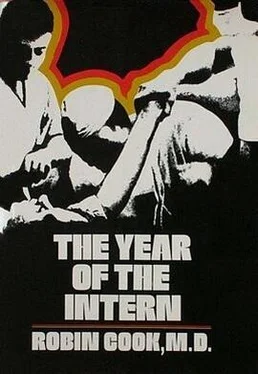“That’s easy enough to say, but I’m not so sure. After all, when someone is bothered by a headache at 4:30 A.M., and he gets a doctor out of bed because health care is his right, what about the rights of that doctor? I mean how much can you impose on one person for the rights of another? Surely the doctor has rights, too.
“And besides, if somebody’s kidneys give out, but all the artificial-kidney machines are in use, whom does the patient sue? Society can’t have an artificial-kidney machine sitting in the corner for every citizen. The fact of the matter is, health care is a service industry provided by highly trained people and sophisticated equipment, both of which are always in short supply. You can’t promise health care to all when you have limited resources.”
“I’m not going to argue that point, Peters. The federal government has clearly defined health care as a right of its citizens by passage of the Medicare and Medicaid laws.”
“Well, Straus, I’d like to talk to you again after you finish your internship. Up until now you’ve been a student, and let’s face it, if things got too bad you could just walk out and leave somebody else with the responsibility. I wonder if you’ll feel the same after this year is over.”
Jan had been listening quietly, more, or less on my side, I thought. Now she chimed in. “There might be some problems with health-care distribution, but we do have the best medicine in the world, Straus. Everybody knows that.”
“Nonsense,” retorted Straus. “Take infant mortality. The United States ranks fourteenth in prevention of infant mortality, eighteenth in projected male life span, and twelfth—”
“Hold on a minute, Straus,” I said, refusing to listen to another statistic.
“Only fourteenth in infant mortality?” asked Jan. Straus had really gotten to her.
“Jan, dear, don’t be misled by statistics. You can prove almost anything with statistics if you deal with different sample populations. It can be a kind of mathematical gerrymandering. Straus, being fourteenth or whatever we are in infant mortality probably has more to do with the fact that we keep such accurate records in this country. Lots of countries record only the births in hospitals. All others go unrecorded.”
“They’re pretty good at record keeping in Sweden,” returned Straus with a smile.
“Well, then, there are differences in records according to what time during the pregnancy the kid came out — whether it was a stillbirth, dead in utero, or whether it was a case where the kid died when it was really a viable being. It makes a big difference where a country draws the line in amassing statistics on infant mortality.”
Straus put up his hands, palms toward me, and slowly lowered them as he continued. “Again, I won’t argue about the technical details of the statistics. But the fact remains that the United States is not at the top. And fourteenth is a pretty low position when you consider where we are in most other technological and service fields. Frankly, Sweden makes us look pretty sick.”
“Sweden doesn’t have our problems,” I said sharply. “They deal with a relatively small, homogeneous population, whereas the United States is a pluralistic society. Do you mean to say you feel that a socialistic welfare state like Sweden is the answer to all social ills, and the solution for us?”
“It seems to be better for infant mortality, and children’s dental care, and longevity. But I’m not saying that the United States should adopt the Swedish system of government or health care. All I’m trying to say is that there are places where health care in general is better than here. That, translated, means that better health care is possible, and we have to make it happen.”
“Well, you can’t create a service industry like medicine out of a vacuum, nor can you abruptly legislate it. Changes in social structure occur only through changes in the attitudes of people. These changes are slow, and related to the educational forces organized to deal with them. People are used to the current doctor-patient relationship. I don’t think they want it to change.”
“For Christ’s sake, Peters, forty million people have never even seen a doctor! How can they develop an attitude? Man, that’s a vacuous excuse. Yet it’s typical, too. You and your buddies can think of a million little irrelevant reasons why the present system should stand without change. That’s why the whole structure has to be scrapped. Otherwise, we’ll water down the problem by compromises like Medicare and Medicaid.”
“So even Medicare and Medicaid are bad. Straus, you’re a real bomb thrower. Everything is black from where you sit. I think Medicare and Medicaid are pretty good laws. The only problem I can see with them is that they screw up the graduate teaching system by making it possible for many of the patients we’d been handling to go to private M.D.’s, who don’t let the interns and residents in on the case. As a result, we have effectively lost a large population of patients for learning.”
“Well, that’s pretty important,” said Straus. “And if s indicative of the Band-Aid solution to gigantic social ills. Yet the biggest problem of Medicare and Medicaid is that they have just thrown more money into the hopper, creating more demand. If the demand goes up and the supply stays the same, prices soar.”
“Sure, sure.” I was getting a little angry now. “What you want is another monolithic government bureaucracy, with millions of file cabinets and typewriters. But this is going to cost a lot of money. Health-care cost would probably go up, not down, with such a bureaucracy. And I suppose you envision all doctors on government salary. That would be interesting! Society is going to be in for a little shock when it finds out how much money it needs to pay those doctors. Financial return would have to go up, as the doctor rapidly learned to compare himself to someone like a unionized airline pilot, who can get about fifty thousand dollars a year for a sixty-five-hour month. How many doctors would it take to man the healthcare system if each one worked sixty-five hours a month? Plus they’ll want retirement benefits—”
“That is a—”
“Just let me finish, Straus. Putting all the doctors on salary would have other, more subtle effects. If you are on salary, no matter what you do, it has an effect on your motivation in marginal situations. Look, Straus, when you drag yourself out of bed at 4:00 A.M., you want something for it, something more than the satisfaction it gives you. Lots of times it doesn’t give you any satisfaction at all. Quite the reverse.
“After all, the garbage man, the airline pilot, everybody else gets overtime. Well, the doctor is going to want that, too, or he won’t crawl out of bed. Let me put it another way. When you work for a salary, you have specific hours. Come five o’clock, and the salaried doctor washes his hands and goes home. I happen to know that, stripped of a lot of mythology, a doctor is a pretty ordinary human being.”
“Can I talk now?” asked Straus.
“Please.”
“Several things. Number one: a national health service is not the only answer. You’re jumping to conclusions. Private prepaid health plans, for instance, work well, plus improving the productivity of individual doctors for a number of reasons. The government’s role could be merely to guarantee that everyone is covered, one way or another, with at least a good-quality, basic health-care package. And number two: I don’t agree with your views about the sleeping doctor. At the same time, I do believe the doctor will have to be paid in relation to some rational scale that compares favorably with airline pilots, or plumbers, or anybody else, keeping in mind the duration and investment of his training, as well as the long hours he must work. But, on top of that, I believe that the professional pleasure of practicing medicine will carry the doctor over the bumps in his day — especially if he is relieved of the burden of paper work and other piddling tasks that absorb twenty-five per cent of the solo practitioner’s time. Besides—”
Читать дальше












